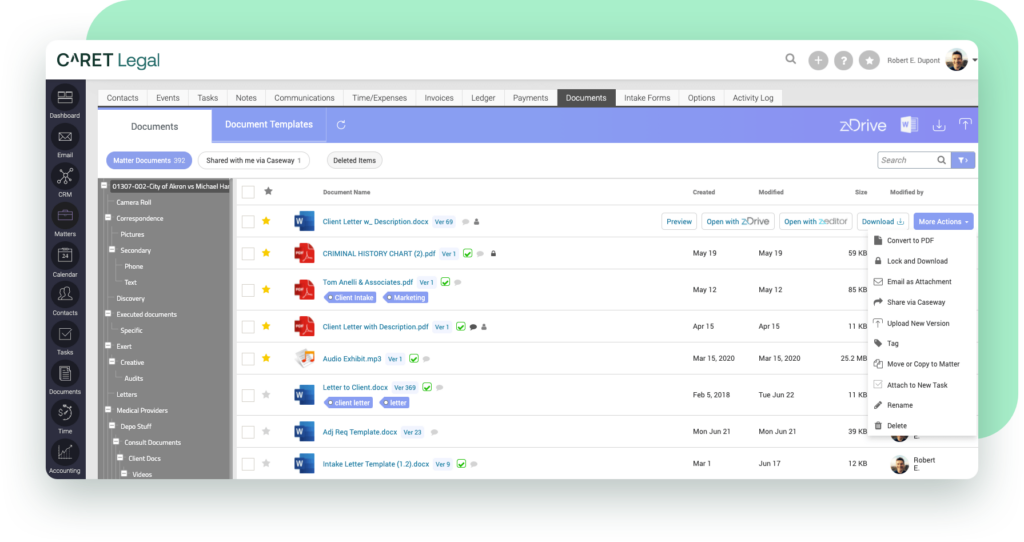Proper records management is vital for the smooth operation of any law firm.
Records management is a critical function in any law firm, ensuring smooth operations and compliance with legal standards. Mismanagement can lead to misplaced documents, delayed case timelines, and unnecessary costs, all of which can negatively impact client service and the firm’s reputation. This blog explores the importance of strong records management practices, how to evaluate your current system, and the benefits of using legal practice management software (LPMS) to organize and optimize your firm’s records.
Signs Your Law Firm Needs Better Records Management
Fragmented records management can create significant challenges for your law firm. If you recognize any of the following issues, it may be time to reassess your approach:
- Misplaced Documents: When a team consistently struggles to locate critical documents, it signals a breakdown in your records management system. This can lead to delays in case preparation and negatively affect client outcomes.
- Slow Retrieval Processes: If retrieving documents is a time-consuming process, it disrupts the firm’s workflow and extends case timelines. A complex retrieval process indicates that your current system needs improvement.
- High Costs from Physical Storage: Maintaining physical records can quickly become costly, both in terms of space and management. Physical documents are also more vulnerable to damage or loss, posing compliance risks and potential legal liabilities.
How to Assess Your Current System
Before making improvements, it’s essential to understand where your current records management system stands. Start with a thorough audit of your current records management system. This involves examining how documents are stored, how easily they can be retrieved, and overall system efficiency. An audit can reveal weaknesses and highlight areas in need of improvement.
Your team interacts with the records management system every day, making their feedback invaluable. Engage with staff to understand the challenges they face with the current system. Their insights can guide you in selecting a solution that truly meets the firm’s needs.
Benefits of LPMS in Effective Records Management
Legal practice management software (LPMS) is a comprehensive digital tool designed to streamline various aspects of a law firm’s operations, including records management. An LPMS integrates case management, document storage, billing, and client communication into a single platform, allowing for seamless coordination and oversight of all firm activities. Here’s how an LPMS can be particularly beneficial for managing your firm’s records:
- Improved Efficiency: LPMS digitizes records and automates workflows, streamlining document retrieval and filing processes. This ensures that documents are organized and accessible, allowing your team to focus on more critical tasks rather than getting bogged down in administrative work.
- Cost Reduction: Transitioning to a digital records management system within an LPMS can significantly reduce costs related to physical storage and paper usage. Digital records also eliminate the need for off-site storage solutions and minimize the risk of lost or damaged documents, ultimately saving the firm money.
- Risk Management and Compliance: An LPMS helps maintain compliance with legal standards by automating document retention policies and tracking access to sensitive information. This reduces the risk of non-compliance and protects your firm from potential legal liabilities, providing peace of mind that your records are securely managed.

Maintaining efficient records management extends beyond just implementing a new system; it requires ongoing management and keeping with best practices.
Transitioning to a Digital Records Management System
Moving from a traditional, paper-based records management system to a digital one requires careful planning and execution. Here’s how to ensure a smooth transition:
- Evaluating Digital Solutions: When selecting a digital records management system, look for features that include secure access controls, audit trails, automated management, and integration capabilities with existing practice management and billing software. Ensure that the system you choose is scalable to accommodate future growth.
- Implementation Strategy: Develop a clear implementation plan that includes a timeline, budget, and designated responsibilities. This plan should cover the steps for digitizing existing records, training staff on the new system, and troubleshooting any issues that arise during the transition.
- Integration with Existing Systems: Ensure that the digital records management system you choose can integrate seamlessly with your current LPMS and billing software. This integration is crucial for maintaining consistency across your firm’s operations and maximizing the benefits of digital records management.
Security Considerations
Security is a top priority when managing legal records. A robust records management system should include secure record retention policies that align with your firm’s ethical and legal obligations. Implementing features such as encryption, secure access controls, and regular backups can protect sensitive client information and ensure compliance with data protection regulations.
Best Practices for Ongoing Records Management
Maintaining efficient records management extends beyond just implementing a new system; it requires ongoing management and keeping with best practices.
Create a detailed policy that outlines the procedures for creating, storing, accessing, and disposing of records. This policy should be regularly reviewed and updated to reflect changes in regulations and industry standards.
Continuous education is crucial for ensuring that all staff members understand and adhere to your records management policy. Provide regular training sessions and resources to keep your team informed about best practices and any updates to the system.
Enhance Your Law Firm Operations with Effective Records Management
Proper records management is vital for the smooth operation of any law firm. By identifying weaknesses in your current system and leveraging the capabilities of an LPMS, your firm can improve operational efficiency, reduce costs, and ensure compliance with legal standards. Investing in better records management not only streamlines day-to-day operations but also contributes to better client service and long-term success.
Looking to upgrade your firm’s records management system? See how CARET Legal can streamline your practice efficiency and compliance. Schedule a free demo today!
